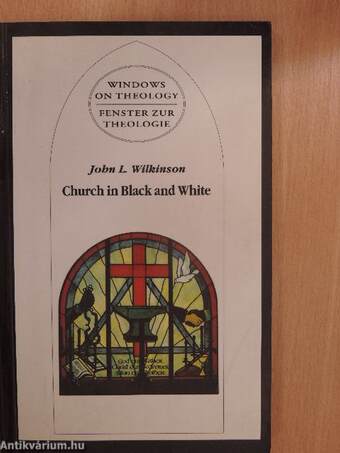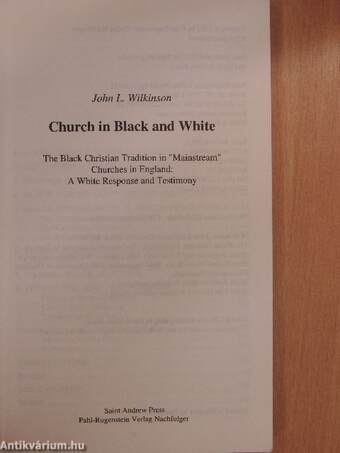1.067.663
kiadvánnyal nyújtjuk Magyarország legnagyobb antikvár könyv-kínálatát

VISSZA
A TETEJÉRE
JAVASLATOKÉszre-
vételek
Church in Black and White
The Black Christian Tradition in "Mainstream" Churches in England: A White Response and Testimony
| Kiadó: | Pahl-Rugenstein Verlag Nachfolger GmbH |
|---|---|
| Kiadás helye: | Bonn |
| Kiadás éve: | |
| Kötés típusa: | Ragasztott papírkötés |
| Oldalszám: | 249 oldal |
| Sorozatcím: | Windows on Theology |
| Kötetszám: | |
| Nyelv: | Angol |
| Méret: | 21 cm x 13 cm |
| ISBN: | 0-86153-154-X |
naponta értesítjük a beérkező friss
kiadványokról
naponta értesítjük a beérkező friss
kiadványokról
Előszó
Foreword
Redeeming a Tragic History:
A Call to Conversion
John Wilkinson's book is likely to be read by many black Christians
belonging to different denominations and traditions in this... Tovább
Előszó
Foreword
Redeeming a Tragic History:
A Call to Conversion
John Wilkinson's book is likely to be read by many black Christians
belonging to different denominations and traditions in this country,
including the independent black-majority churches. After all, it deals
with a story that they all share to a larger or lesser extent.
When black Christians came to these islands with the great immi-
grations that started in the early 1950s', an alarmingly large number
of them felt they were being 'frozen out' of the local, preponderantly
'white-membership' churches to which they thought they belonged.
Those who went through that traumatic experience responded in two
different ways. A certain number opted to walk out of these churches
and to form independent Christian congregations in which they could
feel at home and could create the kind of christian experience that
responded to their needs. These are the independent 'black-majority'
churches which have become such a marking feature of present-day
British Christianity. But an equally significant number chose to
remain in their denominations of origin and to carry on from the
inside the demanding task of helping to create visibly multi-cultural
and multi-racial congregations such as would prove the truth of Paul's
declaration: 'For (in Christ) . . . there is neither Jew nor Greek,
there is neither slave nor free, there is neither male nor female (and
add: neither white nor black)' (Galatians 3:28)
This book sets out to listen to the story of this section of black
Christians. It does far more than that: it goes on to propose what the
author feels should be the appropriate and constructive response, on
the part of the white membership of those churches, to the prophetic
challenge thrown by their black brothers and sisters. Indeed Wilkinson
makes it very clear that this book is meant to be 'a white response and
testimony'. In that sense it surely is a brave and daring exercise, and
one wonders what kind of reception his book will get from those it
seeks to engage in dialogue. Vissza
Tartalom
Contents
1. A NEW PEOPLE IS BORN 1
2. DISCOVERING BLACK CHRISTIANITY 7
3. ENGLISH CHRISTIANITY AND BLACK PEOPLE 18
4. BLACK CHRISTIANITY BEFORE EMANCIPATION 36
5. BLACK CHRISTIANITY: A TRIPLE INHERITANCE 53
The American inheritance 53
The Caribbean inheritance 69
The British inheritance 78
6. COMPREHENSIVENESS AND BLACK
CHRISTIANITY 87
7. NAMING BLACK AS BLACK 101
8. PLUMB LINES AND NEW BUILDING 133
Change at the national level 147
Change at the local level 160
Theological education 164
9. MEETING AROUND THE CROSS 171
Identities and the Cross 179
Conversion 185
ABBREVIATIONS 201
NOTES 203
BIBLIOGRAPHY 230
INDEX 246
Témakörök
- Idegennyelv > Idegennyelvű könyvek > Angol > Művelődéstörténet
- Idegennyelv > Idegennyelvű könyvek > Angol > Vallás > Kereszténység
- Művelődéstörténet > Eszmetörténet > Vallás
- Szociológia > Társadalmi csoportok > Kisebbségek > Egyéb
- Vallás > Kereszténység > Története
- Vallás > Kereszténység > Egyházak, felekezetek > Egyéb
- Szociológia > Szakszociológiák
- Idegennyelv > Idegennyelvű könyvek > Angol > Szociológia > Szakszociológiák
- Idegennyelv > Idegennyelvű könyvek > Angol > Szociológia > Társadalmi csoportok > Kisebbségek > Egyéb
- Idegennyelv > Idegennyelvű könyvek > Angol > Vallás
- Vallás
- Vallás > Kereszténység > Tanulmányok
- Vallás > Határtudományok







